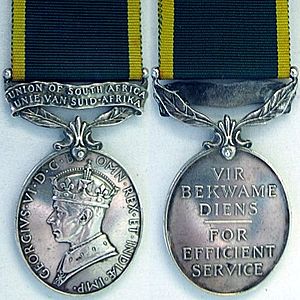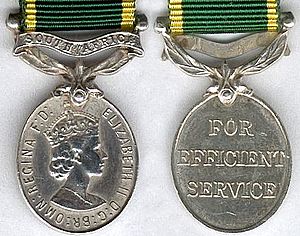Efficiency Medal (South Africa) facts for kids
Quick facts for kids Efficiency Medal (South Africa) |
|
|---|---|

King George VI version
|
|
| Country | |
| Type | Military long service medal |
| Eligibility | Part-time other ranks and some officers |
| Awarded for | Twelve years of efficient service |
| Status | Discontinued in 1952 |
| Clasps | For further periods of 6 years service |
| Statistics | |
| Established | 1930 |
| South African order of wear | |
| Next (higher) | |
| Equivalent | |
| Next (lower) | |
Ribbon Bar |
|
The Efficiency Medal (South Africa) was a special award given in South Africa starting in 1930. It was for people who served part-time in the military, like soldiers and non-commissioned officers, for 12 years of good service. If they served even longer, they could get a 'clasp' (a small bar) added to their medal ribbon for every six extra years of good service.
This medal replaced an older one called the Colonial Auxiliary Forces Long Service Medal. The Efficiency Medal was later replaced by the John Chard Medal in 1952.
Contents
What is the Efficiency Medal?
The Efficiency Medal (South Africa) was created by a special Royal Warrant on 23 September 1930. It was a long service award for part-time soldiers in the Citizen Force of the Union Defence Forces.
The medal had a special title on it to show that the person earned it while serving in South Africa's Citizen Force. This title was written in both English and Afrikaans on a small bar attached to the medal. Officers received a similar award called the Efficiency Decoration (South Africa).
Who Earned This Medal?
The medal was given to part-time warrant officers, non-commissioned officers, and soldiers. They needed to have 12 years of continuous good service as a volunteer in the Citizen Force.
Service during wartime counted double towards the 12 years. Also, service between 3 September 1939 and 1 March 1950 did not have to be continuous. Short breaks in service were allowed, as long as they met certain rules.
Clasps for Longer Service
Clasps were small bars added to the medal ribbon. At first, clasps were given for 18 and 24 years of good service. Later, in 1944, more clasps could be earned for every six extra years after 24 years. If someone wore only the ribbon (without the medal), they would wear a small silver flower on the ribbon to show each clasp they earned.
Officers and the Medal
In 1946, a change was made to allow some part-time officers to also receive the medal and clasps. This applied to officers who were serving in the Citizen Force on 2 September 1939 and were called up for war service during the Second World War. Many soldiers became officers during the war. This change made sure they could still earn the Efficiency Medal. However, officers who had already earned the Efficiency Decoration were not eligible for this medal.
Who Was Eligible?
Initially, the medal was only for members of the South African Army and South African Air Force. On 1 August 1942, the South African Navy was formed. After this, members of the South African Naval Citizen Force also became eligible for the medal.
How the Medal Looked
The medal was made of silver and was oval-shaped. It was about 39 millimetres high and 32 millimetres wide. It had a fixed bar at the top shaped like laurel leaves, which connected to the ribbon. The name of the person who received the medal was carved on its edge.
Front of the Medal
There were three different versions of the medal's front side, but only the first two were actually given out. Each version showed the crowned image of the king or queen at the time.
- The first version showed King George V wearing his coronation robes and crown.
- The King George VI version was made after he became king in 1936. It showed him in his coronation robes and crown, facing left.
- The Queen Elizabeth II version was made after she became queen in 1952. It showed her facing right and wearing her crown. However, this medal was never given out because it was replaced by a new medal very soon after she became queen.
Scroll Bar
The scroll bar on the King George VI medal had "UNION OF SOUTH AFRICA" and "UNIE VAN SUID-AFRIKA" written on it in two lines. The Queen Elizabeth II version had only English on its scroll bar, but as mentioned, it was never awarded.
Back of the Medal
The back of the medal was smooth and had the words "FOR EFFICIENT SERVICE" written in three lines. On the King George VI version, it also had the Afrikaans words "VIR BEKWAME DIENS" written below the English.
Clasp
The clasp was a silver bar with a raised Tudor Crown design. It was designed to be sewn onto the medal ribbon.
Ribbon
The ribbon was 32 millimetres wide and dark green. It had a 3 millimetres wide lime yellow band along each edge.
When the Medal Ended
On 6 April 1952, the Efficiency Medal was replaced by the John Chard Medal. The John Chard Medal could be given to all ranks (soldiers and officers) after 12 years of continuous good service in the Citizen Force.
Images for kids
 | Claudette Colvin |
 | Myrlie Evers-Williams |
 | Alberta Odell Jones |


